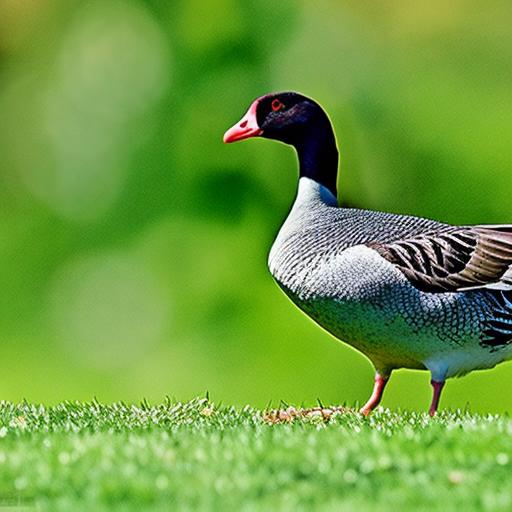Geese infestation is a common problem in many areas, causing damage to property, creating unsightly messes, and posing potential health risks. Finding humane solutions to control the geese population is important to ensure the well-being of both humans and geese. In this article, we will explore various strategies for managing geese infestation, including natural deterrents, physical barriers, decoys, sound-based repellents, chemical repellents, landscaping techniques, and creating an uninviting environment for geese. By implementing these strategies, we can effectively control the geese population while respecting their welfare.
Key Takeaways
- Geese are social animals that prefer open spaces near water and grassy areas.
- Natural deterrents for geese include planting certain types of vegetation and using dogs to patrol the area.
- Physical barriers like fences and netting can be effective in keeping geese away.
- Decoys like fake predators or other geese can scare away geese.
- Sound-based repellents like loud noises or predator calls can also be effective in deterring geese.
Understanding the behavior of geese
To effectively manage geese infestation, it is important to understand their behavior. Geese are social animals that live in flocks and are highly adaptable to different environments. They are attracted to areas with open spaces, water sources, and abundant food supply. Geese are also known to be territorial and protective of their nests and young. Understanding these behaviors can help us develop effective strategies for managing geese infestation.
Natural deterrents for geese
One way to deter geese from an area is by using plants and herbs that they dislike. Geese have a strong sense of smell and are repelled by certain scents. Planting herbs such as lavender, rosemary, and mint can help deter geese from an area. These plants emit strong scents that geese find unpleasant. Additionally, planting tall grasses or shrubs can create barriers that make it difficult for geese to access certain areas.
Another natural deterrent for geese is the use of dogs. Geese are naturally afraid of predators, and the presence of a dog can scare them away. Training a dog to chase away geese can be an effective way to control their population in a specific area. However, it is important to ensure that the dog is well-trained and does not harm the geese.
Physical barriers to keep geese away
Installing physical barriers is another effective strategy for keeping geese away. Fencing and netting options can be used to create barriers that prevent geese from accessing certain areas. Fences should be at least three feet high and have small gaps to prevent geese from squeezing through. Netting can be installed over ponds or other water sources to prevent geese from landing and swimming.
Another option is to install goose-proof gates. These gates are designed to prevent geese from entering an area while allowing humans and other animals to pass through. Goose-proof gates are typically taller than regular gates and have a design that makes it difficult for geese to climb or fly over.
Using decoys to scare geese
Decoys can be an effective way to scare geese away from an area. There are different types of decoys available, including stationary decoys, motion decoys, and predator decoys. Stationary decoys are placed in an area to create the illusion of a flock of geese. Motion decoys have moving parts that mimic the movement of real geese. Predator decoys, such as coyote or fox decoys, can also be used to scare geese away.
To use decoys effectively, it is important to move them regularly to create the impression of a dynamic flock. Geese are intelligent animals and can quickly learn that stationary decoys are not a threat. By moving the decoys regularly, we can maintain their effectiveness in deterring geese.
Sound-based repellents for geese

Sound-based repellents can be an effective way to deter geese from an area. Sonic devices that emit distress calls of geese can create the impression of danger and scare them away. These devices can be placed in strategic locations to create a deterrent effect.
Ultrasonic devices that emit high-frequency sounds can also be used to repel geese. These devices emit sounds that are outside the range of human hearing but are uncomfortable for geese. Ultrasonic devices can be placed in areas where geese are likely to gather, such as lawns or ponds.
Chemical repellents for geese
There are various chemical repellents available that can be used to deter geese. It is important to choose eco-friendly options that are safe for both humans and geese. Chemical repellents can be sprayed on grass or other surfaces to create a deterrent effect. However, it is important to follow the instructions carefully and avoid using chemicals that may harm the environment or other animals.
Landscaping techniques to discourage geese
Modifying the landscape can make it less attractive to geese and discourage them from staying in an area. This can be done by removing open spaces and creating barriers with rocks or other natural materials. Geese prefer open spaces where they have a clear view of their surroundings. By creating barriers with rocks or other materials, we can make it difficult for geese to access certain areas.
Additionally, keeping the grass short and removing excess water sources can make an area less attractive to geese. Geese prefer areas with tall grass where they can graze and areas with water sources where they can swim. By keeping the grass short and removing excess water sources, we can discourage geese from staying in an area.
Creating an uninviting environment for geese
To discourage geese from staying in an area, it is important to remove food sources and keep the area clean and free of debris. Geese are attracted to areas with abundant food supply, such as lawns with lush grass or areas with spilled birdseed. By removing these food sources, we can make an area less attractive to geese.
Keeping the area clean and free of debris is also important to discourage geese from staying. Geese are attracted to areas with water sources and open spaces where they can rest. By keeping the area clean and free of debris, we can make it less inviting for geese to stay.
Strategies for long-term goose control
To effectively control the geese population in the long term, it is important to implement a combination of deterrents. Geese are intelligent animals and can quickly adapt to new deterrents. By using a combination of strategies, we can maintain their effectiveness and prevent geese from becoming accustomed to a single deterrent.
Regular maintenance and monitoring are also important for long-term goose control. It is important to regularly check and maintain physical barriers, decoys, sound-based repellents, and chemical repellents to ensure their effectiveness. Additionally, monitoring the geese population and their behavior can help us identify any changes or new challenges that may require adjustments to our strategies.
Seeking professional help for goose management
In some cases, it may be necessary to seek professional help for goose management. This is especially true if the geese infestation is severe or if other strategies have been ineffective. A reputable goose management company can provide expert advice and assistance in developing a comprehensive plan for managing geese infestation.
When choosing a goose management company, it is important to consider their experience, expertise, and reputation. They should have a proven track record of successfully managing geese infestation and should use humane methods that prioritize the welfare of both humans and geese.
Geese infestation can be a challenging problem to deal with, but by implementing the strategies outlined in this article, we can effectively control the geese population while respecting their welfare. It is important to find humane solutions that prioritize the well-being of both humans and geese. By taking action and implementing these strategies, we can create a harmonious coexistence with geese while minimizing the negative impacts of their presence.
If you’re looking for effective ways to keep geese off your lawn, you might also be interested in learning about the benefits of raising chickens for a family of four. Poultry Wizard has a helpful article on how many chickens you need for a family of four, which can provide insights into the ideal number of chickens to meet your family’s egg and meat needs. Check out the article here to discover more about this fascinating topic.
FAQs
What are some natural ways to keep geese off my lawn?
Some natural ways to keep geese off your lawn include planting tall grasses or shrubs, using decoys or scare tactics, and installing motion-activated sprinklers.
What are some non-natural ways to keep geese off my lawn?
Some non-natural ways to keep geese off your lawn include using chemical repellents, installing physical barriers such as fences or netting, and using noise-making devices.
Why do geese like to graze on lawns?
Geese like to graze on lawns because they provide a large open space with easy access to water and food sources. Lawns also provide a safe place for geese to rest and raise their young.
Are geese harmful to my lawn?
Geese can be harmful to lawns as they can cause damage to grass and other vegetation by overgrazing and trampling. They can also leave behind large amounts of droppings which can be unsightly and potentially harmful to human health.
What are some potential health risks associated with geese on my lawn?
Geese droppings can contain harmful bacteria such as E. coli and Salmonella which can cause illness in humans. In addition, geese can carry parasites such as ticks and mites which can also pose a health risk.
Meet Walter, the feathered-friend fanatic of Florida! Nestled in the sunshine state, Walter struts through life with his feathered companions, clucking his way to happiness. With a coop that’s fancier than a five-star hotel, he’s the Don Juan of the chicken world. When he’s not teaching his hens to do the cha-cha, you’ll find him in a heated debate with his prized rooster, Sir Clucks-a-Lot. Walter’s poultry passion is no yolk; he’s the sunny-side-up guy you never knew you needed in your flock of friends!







